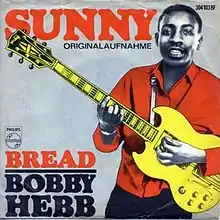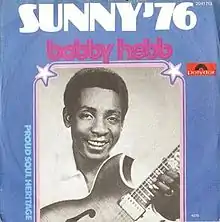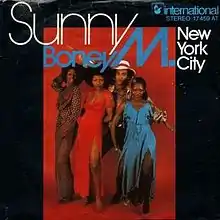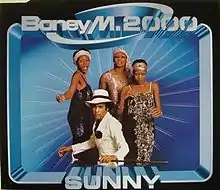Sunny (Bobby Hebb song)
"Sunny" is a soul jazz song written by Bobby Hebb in 1963. It is one of the most performed and recorded popular songs, with hundreds of versions released. BMI rates "Sunny" #25 in its "Top 100 songs of the century".[1] It is also known by its first line: "Sunny, yesterday my life was filled with rain".[2]
| "Sunny" | ||||
|---|---|---|---|---|
 | ||||
| Single by Bobby Hebb | ||||
| from the album Sunny | ||||
| B-side | "Bread" | |||
| Released | June 1966 | |||
| Recorded | February 21, 1966 | |||
| Studio | Bell Sound Studios, New York City | |||
| Genre | Soul jazz | |||
| Length | 2:44 | |||
| Label | Philips | |||
| Songwriter(s) | Bobby Hebb | |||
| Producer(s) | Jerry Ross | |||
| Bobby Hebb singles chronology | ||||
| ||||
| "Sunny '76" | |
|---|---|
 | |
| Single by Bobby Hebb | |
| B-side | "Proud Soul Heritage" |
| Released | 1975 |
| Genre | Disco |
| Length | 3:31 |
| Label | Polydor |
| Songwriter(s) | Bobby Hebb |
| Producer(s) | Joe Renzetti & Marty Sheriden |
Background and composition
Hebb's parents, William and Ovalla Hebb, were both blind musicians. Hebb and his older brother Harold performed as a song-and-dance duo in Nashville, beginning when Bobby was three and Harold was nine. Hebb performed on a TV show hosted by country music record producer Owen Bradley.
Hebb wrote the song in the 48 hours following a double tragedy on November 22, 1963: the day U.S. President John F. Kennedy was assassinated, and Hebb's older brother Harold was also stabbed to death outside a Nashville nightclub. Hebb was devastated by both events and many critics say that they, and critically the loss of his older brother, inspired the lyrics and tune. According to Hebb, he merely wrote the song as an expression of a preference for a "sunny" disposition over a "lousy" disposition following the murder of his brother.[3]
Events influenced Hebb's songwriting, but his melody, crossing over into R&B (#3 on U.S. R&B chart) and Pop (#2 on U.S. Pop chart), together with the optimistic lyrics, came from the artist's desire to express that one should always "look at the bright side". Hebb has said about "Sunny": "All my intentions were to think of happier times and pay tribute to my brother – basically looking for a brighter day – because times were at a low. After I wrote it, I thought 'Sunny' just might be a different approach to what Johnny Bragg was talking about in 'Just Walkin' in the Rain.'"
Mieko Hirota version
"Sunny" was first recorded by Mieko "Miko" Hirota – the "Connie Francis of Japan" and Billy Taylor trio (feat. Ben Tucker and Grady Tate) on the Columbia records release "Miko in New York" (1965), recorded in New York. It was also released on the audio album Hit Kit Miko, Vol. 2 (October 20, 1965).
Dave Pike version
In America it was released by marimbaphonist Dave Pike on Atlantic Records in 1966 on the Jazz for the Jet Set album, recorded in New York City on October 26 and November 2, 1965. Grady Tate, who played drums on Mieko Hirotas version, also played on this version.
Bobby Hebb version
The personnel on the Bobby Hebb recording included Joe Shepley, Burt Collins on trumpet, Micky Gravine on trombone, Artie Kaplan and Joe Grimaldi on sax, Artie Butler on piano, Joe Renzetti and Al Gorgoni on guitar, Paul (PB) Brown and Joe Macho on bass, Al Rogers on drums and George Devens on percussion. The song was recorded while the session was in overtime; many of the studio musicians booked for that date had to leave early for other recording sessions. Joe Renzetti was the arranger.
"Sunny" was originally part of an 18-song demo recorded by producer Jerry Ross, also famous for Spanky and Our Gang, Keith's "98.6" and "Apple, Peaches, Pumpkin Pie" by Jay & the Techniques (Hebb was offered this song but didn't want to be considered a novelty act and let the song go to Jay Proctor).
"Sunny" was recorded at Bell Sound Studios in New York City and released as a single in 1966. It met with immediate success, which resulted in Hebb touring in 1966 with the Beatles. The song peaked at No. 2 on the Billboard Hot 100 chart in late August 1966.[4]
Weekly charts
Year-end charts
Sunny '76"Sunny '76'" is a disco take on Bobby Hebb's song. Like the original 1966 version, it features Hebb; however, an updated disco beat was implemented with an eye to having it played in discos around the world. This version was arranged by Joe Renzetti, who also arranged the original record. The 7-inch single was released in late 1975. The B-side featured another song of Hebb's called "Proud Soul Heritage". Cher versionCher recorded the song for her third solo album Chér, it was released as the third single in Europe and Asia, achieving success in numerous European countries. It is considered to be a tribute to her then husband, Sonny Bono. Weekly charts
Year-end charts
Boney M. version
German euro disco group Boney M. recorded the song for their 1976 debut album, Take the Heat off Me, produced by Frank Farian and arranged by Stefan Klinkhammer in a euro disco arrangement. Following their breakthrough single "Daddy Cool", it topped the German charts and reached the top ten in many other countries.[20][21][22] The single was backed by a non-album track "New York City", a reworked version of Farian artist Gilla's 1976 hit single "Tu es!" and its English version "Why Don't You Do It", with an intro borrowed from the Boney M. album track "Help Help", issued only in some territories instead of "Baby Do You Wanna Bump" on "Take the Heat off Me". The recording was remixed in 1988, 1999 (it was a minor hit single in early 2000) and 2015, and has been sampled by Boogie Pimps for their 2004 version. While Liz Mitchell sang the original lead vocals on Boney M.'s version, original member Maizie Williams recorded a solo version in 2006. The original version was featured in the Umbrella Academy Season 2 soundtrack.[23] Charts
2000 remix
The final single from Boney M.'s remix album 20th Century Hits which peaked at #80 in the Swiss charts. The CD single was released with 8 mixes. A "London Mix" was released on the promotional double-12" single. Other recordingsAt least 75 other artists have recorded versions of the song, including Stevie Wonder, Marvin Gaye and Roger Kellaway. Georgie Fame's and Cher's issues both charted in the UK Top 75 in 1966. Christophe Willem covered the song in 2006 (#3 in France, #9 in Belgium (Wallonia), #17 in Switzerland).[24] Chilean singer Buddy Richard recorded a Spanish version of the song as "Cielo", using the same melody as the original by Hebb. Other usesThe 2011 South Korean film Sunny took its name from the song, and the song itself was heavily featured in the film. It went on to become a number-one hit in the Korean national singles chart. Hebb's version appears in a 2018 TV commercial for Indeed.[25] A cover version appears in another 2018 ad, this one for Visit Israel.[26] It was also a frequently used intro-song for basketball recruiting mogul, Sonny Vaccaro, when he was a guest on various national and regional radio broadcasts. This song was also being used in a Volkswagen Golf commercial in 2017. Billie Eilish and Finneas sang the song for the COVID-19 benefit event One World: Together at Home in 2020.[27] In 2019, the Boney M. version's intro is used as the background music for New Zealand phone company, 2degrees. The Boney M. version has also appeared in television series such as in season one of Titans and season two of The Umbrella Academy. References
External links | ||||||||||||||||||||||||||||||||||||||||||||||||||||||||||||||||||||||||||||||||||||||||||||||||||||||||||||||||||||||||||||||||||||

